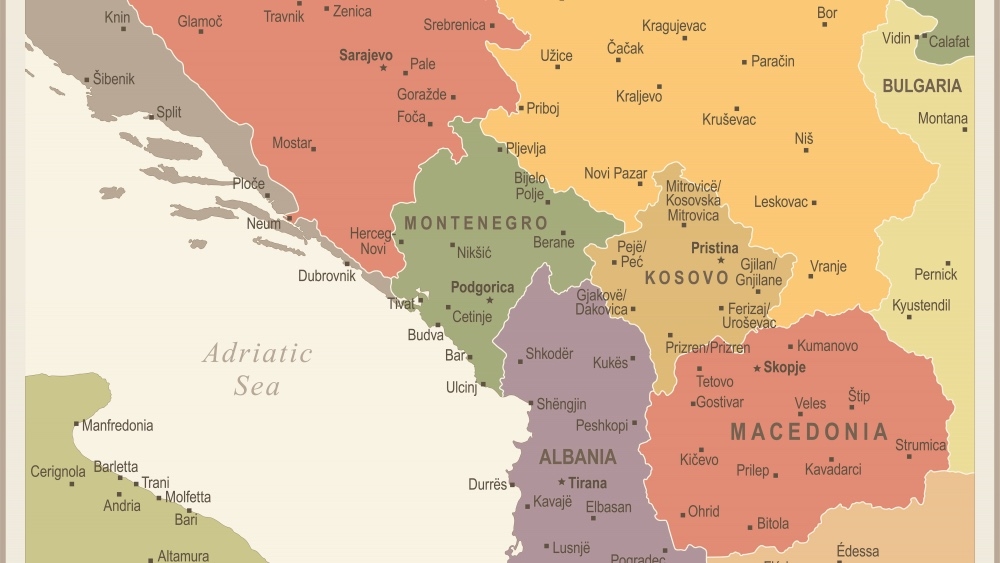Its ontological meaning is rather pejorative, for it signifies an unexpected occurrence of an unprecedented, unpredictable, and uncontrollable series of events or a process that inadvertently leads to an ultimate disintegration of a broader political unit (such as a seemingly monolithic federal state) and its abrupt replacement with a number of fully or partly independent political units that are destined to end up inherently unstable, unpredictable, and prone to various hostilities against one another. Recently, however, the word “Balkanization” has become overwhelmed and is used in many cases unfoundedly or inaccurately. Most recently, it is customary to talk about “Balkanization” in connection with the civil war in Ukraine.
Naturally, from the historical perspective, it makes a perfect sense to avail oneself of this term, for the sociopolitical situation in the Balkan peninsula has never been particularly stable. This is particularly true for the last century when the political map of the region underwent several tectonic shifts, starting with the very chaotic breakup of the Ottoman Empire, the First and Second Balkan Wars, and the assassination of Archduke Ferdinand (the heir to the Austro-Hungarian Empire) in Sarajevo, which, as it turned out, ended up being a sufficient pretext for the breakout of the First World War. Surely, a careful student of European history will also point out that those familiar-sounding terms instability, unpredictability, and destabilization could easily be applied to describe the region throughout the Second World War. It most certainly did not help that the ethnic groups inhabiting the region were rather inconsistent in the way they expressed their political aspirations throughout this period: some of them supported the Nazi dream of turning the region into their colony, others sympathized with the Allies, whilst others succumbed to the Communist dream of collective internationalization.
The instrumental way the western Balkan nations were incorporated into a newly demarcated Yugoslavian state hardly resolved these tensions or blurred the lines of the ethnic divisions running through this difficult region. On the contrary, the semi-dictatorial tendencies of the post-1945 period cooled down the Balkan kettle only on the face of it despite the aspirations of Josip Broz Tito, who kept a tight grip on power in Yugoslavia (1943-1980) by trying to reinforce a Yugoslav identity at all costs. Nicolae Ceaușescu dominated the politics of Romania with a very similar strategy of prioritizing unity and order over pluralism and diversity for more than two decades (1965-1989). Also, to a certain degree, Todor Zhivkov tried to replicate some of these policies in Bulgaria (1954-1989), but instead they just reinforced a very peculiar mix of extremely pluralistic ideologies and ethnic and religious diversity. By the beginning of the 1990s, the entire region was brought to an open-ended ultra-nationalistic hawkish confrontation that raged through the entire western Balkan Peninsula: the Serbs were particularly difficult to deal with, for when Bosnia declared its independence from Yugoslavia, they retaliated in a completely disproportional manner by engaging in a dreadful campaign of ethnic cleansing against local ethnic minorities, crimes against humanity, and genocide.
Naturally, a careful political scientist always prefers to err on the side of caution, but it is high time to acknowledge that despite its historical hostilities, the entire Balkan peninsula has come a long way since the end of the 1990s, as the politics of yesterday’s animosities have been steadily replaced with a far more cosmopolitan spirit of mutual trust, understanding, and collaboration. With some notable exceptions, former enemies started to collaborate economically, culturally and politically in a much more eager manner and the entire peninsula has undergone a massive positive transformation in the way political disagreements are dealt with during the last two or three decades.
Thanks to this new political climate, we were able to witness a very peaceful dissolution of the Federal Republic of Yugoslavia when Montenegro declared its independence in 2006. Noticeably, despite heightened political tension, when Kosovo declared its independence in 2008, Serbia did not resort to open-ended confrontation, which showed a lot of self-restraint on the part of its political leadership. The political climate in the Balkans became so favorablethat Croatia and Albania could join NATO in 2009 and Croatia could join the EU in 2013 without much protest from neighboring countries, which had a considerable positive impact on the way the region has been approached from the global perspective. Meanwhile, no one (maybe apart from the current occupant of the Kremlin) questioned Montenegro’s intentions when it joined NATO in 2017, and no one was against North Macedonia’s transatlantic aspirations, especially after it signed the Prespa agreement with Greece that resolved the “forever-lasting” dispute over the country’s name, and the country was renamed the “Republic of North Macedonia” and joined NATO in 2020. This country is also in the final stages of its EU application and should (hopefully) resolve its disagreements with Bulgaria in 2022 or 2023.
Therefore, is it very surprising that despite all those positive changes, the term “balkanization” is still used as a label in a very instrumental manner to associate its pejorative historic meaning with various contemporary conflict-prone regions, such as the South Caucasus, Sahel, the Horn of Africa, Transcaucasia, or even the greater Middle East. This is simply unacceptable, for it is an inaccurate misrepresentation, generalization, and mischaracterization that does not consider all the positive changes that have happened in the region since the end of the 1990s. The inherently volatile, hawkish, and irresponsible politicians have been replaced with a completely new generation of Western-educated elites who win elections with promises of fighting corruption, replacing the old way of doing things with much broader accountability, transparency, far-reaching socioeconomic reforms, and infrastructure projects.
Unfortunately, the 19th century type of doing politics and seeking “one’s greatness” by bringing nations to the brink of regional confrontation is not completely extinct.
The biggest paradox of the current situation in the Ukrainian-Russian borderland is the fact that Russian Federation tries to replicate the very same actions that led the USSR to its ultimate collapse. Putin is not Milosevic, but surely, he should try to learn from his mistakes, for if Russia continues to behave like a regional bully, it will end up like Japan, which, according to Samuel Paul Huntington, is a “civilization without any followers” precisely because of its historical legacy. Russia’s hawkish behavior only exposes its internal weakness, for economically, it is a colossus with feet of clay. Putin should abandon his idea of military conquest for Russia’s own sake, for this type of behavior will inevitably backfire on him. Even if the Russian army gains some territory in Ukraine, Russia will ultimately losethe rest of its soft power, and possibly will be a subject to more severe sanctions.
Thus, if the Russian military actions near the borders of Ukraine remain a mere threat, an act of a political pressure, then it would make more sense replacing the term “Balkanization” with “Ukrainianization”, as it would describe the situation more accurately. However, if the Russian armed forces were to enter the territory of Ukraine the way they did in Georgia in 2008 (South Ossetia, Abkhazia), it would be much more appropriate to describe the events as "Russianisation" or "Georgianisation", since we have not seen a similar phenomenon in the Balkans in the last decades. If we insist on using the notion “Balkanization” at all costs, let us, at least add that we intend to draw parallels with the processes of the twentieth century.
*
Piotr Pietrzak, Ph.D., is co-founder and editor-in-chief of In Statu Nascendi – Journal of Political Philosophy and International Relations, a non-profit charitable organization based in Sofia, Bulgaria. He regularly comments on matters related to superpower competition during and after the cold war. His most recent book is On the Idea of Humanitarian Intervention: A New Compartmentalization of IR Theories.
Please also see:
- On the connection between conflict resolution theory and practice: MCC Podcast: Is it possible to connect conflict resolution theory and practice? - Piotr Pietrzak - YouTube
Piotr Pietrzak at a Roundtable Discussion on State-building, Democratization and EU-accession Perspectives of Balkan Countries (mcc.hu)









